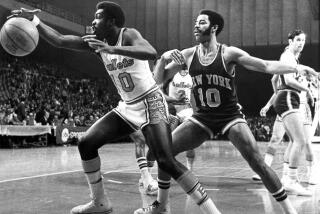The Veteran and the Refugee--Fishing : FAIR WEATHER FOUL <i> by Sean Freeman (William Morrow: $16.95; 191 pp.) </i>
The Vietnam War veteran has been reduced to a veritable stereotype in recent literature and cinema. The typical vet is depicted as an outcast who can’t enter the mainstream of an America that is embarrassed by and ungrateful for the services he rendered. At worst, the veteran is categorized within a narrow, negative band of social misfits which doesn’t extend beyond bitter addicts, dangerous mercenaries or deranged killers.
Sean Freeman does little to dispel the stereotype in his new novel, “Fair Weather Foul.” His protagonist is Mike Crandel, a Vietnam veteran who returned with a prosthetic hook where his right hand used to be and a neurotic paranoia where his right mind used to be. Crandel occasionally wears a pirate’s eye patch to emphasize the one debility and takes little blue pills to suppress the other.
His neurosis flares uncontrollably one night, fueled by too much Scotch, beer and anger, while his wife plays out a mock-violent sexual fantasy. The session quickly loses its mock nature and becomes genuinely violent when he brandishes his hook as a weapon and almost impales her. His wife leaves him, and all Crandel wants to do is live the life of an independent salmon fisherman in the waters of his beloved Pacific Northwest.
He needs a crew member on his small boat, and into his life walks Tu Van Huyen, a Vietnamese refugee. When Crandel hires Tu, he incurs the wrath of the local fishermen for introducing a foreigner into the highly competitive and protective industry. But even in the face of vandalism and threats, Crandel doesn’t capitulate.
Tu turns out to be a sort of lucky charm for catching salmon, which further enrages the other fishermen. He also turns out to be a former soldier of the North Vietnamese army and not the South Vietnamese, as Crandel had automatically assumed. This revelation gives “Fair Weather Foul” its dose of irony; Crandel finds himself doing his utmost to protect a man who, in another place and time, he would have done his utmost to destroy.
Freeman is himself a Vietnam veteran, so it is possible that this first-person account is fiction laced with autobiography. Yet the opportunity for any introspection on the part of the hero is not seized here. Crandel refrains from traveling into his own turbulent mind, and the entire novel remains on a surface plane of action and reaction. The discovery that Tu was an enemy soldier is the mid-point crisis of the story, yet the fact is dismissed as a minor annoyance. Crandel ruminates only briefly: “I contemplated what difference it made to me that Tu was North Vietnamese. Did I really care, or was I just startled?” Mike Crandel would react with more emotion if he learned that the beer supply had been exhausted.
The one concession made to an analysis of character motivation is a recognized dichotomy between the sheer will to survive and the desire to live in an ordered society. Freeman often refers to the survival instinct as “brain-of-the-dog,” which he defines as “that reflexive scratch-and-sniff of primal consciousness.” This instinct was finely honed in Crandel as a soldier and it must now be pitted against the checks and balances of reason that he is expected to employ as a civilian.
What talent Freeman lacks for introspection he makes up for with his keen eye for detail. He is able to capture minute and subtle visible movements. How odd and disappointing it is then that this talent is directed almost exclusively to recording the smoking habits of his characters. Freeman describes exactly how someone holds a cigarette, inhales it, exhales it and discards it. He vividly illustrates how deftly the hero can peel the cellophane from a fresh pack and extract a cigarette using only his hook. This obsession is carried to the point of subjecting the fine points of characterization to smoking references. A character’s personality is foreshadowed by the type of apparatus he uses to light cigarettes. Crandel’s sellout of a father flicks the disposable commercialized Bic lighter, loyal companion Tu uses the reliable Zippo and Crandel himself produces anachronistic wooden matches.
Freeman’s style is uneven. He is capable of creating particularly good moments, as when Crandel lectures to his narrow-minded parents at the dinner table about his association with Tu: “ ‘If Vietnam vets are painful to look at, . . . especially if they are disfigured, and Vietnamese refugees are an accusatory presence, then in combination we must be a nightmare.’ Both my mother and father held their coffee cups to their faces as if they were porcelain oxygen masks capable of filtering out any harsh, unpleasant realities that might infest their existence.” But he also creates real clinkers. For instance, when Crandel thinks about his destructive relationship with his wife, Freeman writes, “I had been in love, deeply in love, with a dollop of lust on top. But it had overflowed. And like droplets of hot creosote, it had lit the dry understory, eventually burning it to a firestorm. That’s how it had been the night I’d almost done her in.” There are too many such inelegant passages containing metaphors that are not only mixed, but tossed.
“Fair Weather Foul” is Freeman’s Vietnam catharsis. It is a story he had to get out of his system. Unfortunately, it doesn’t get into ours.
More to Read
Sign up for our Book Club newsletter
Get the latest news, events and more from the Los Angeles Times Book Club, and help us get L.A. reading and talking.
You may occasionally receive promotional content from the Los Angeles Times.




